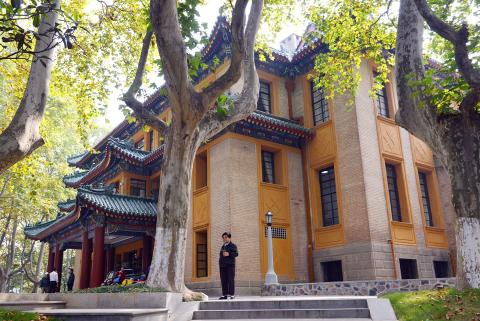Chinese Communist Party authorities have restored an 80-year-old house once used by Chiang Kai-shek (蔣介石), as changing relations with Taiwan transform an archenemy into a recognized figure.
Political differences were plastered over as Nanjing — once China’s capital under the Chinese Nationalist Party (KMT) — spent US$4.9 million to renovate the three-story house at the base of a hill.
It was one of several houses used by Chiang and his wife Soong Mayling (宋美齡) before they fled to Taiwan in 1949 at the end of the Chinese civil war.

Photo: AFP
Chiang led Taiwan as president until his death 26 years later, still proclaiming himself the rightful ruler of the whole of China.
For decades, the building was kept as a state guesthouse and closed to the public, but the doors were thrown open after a year-long renovation was completed in October.
“This renovation has a very important use for cross-strait cultural exchanges, so we considered that,” said Liao Jinhan, deputy head of the Chinese government agency that administers the surrounding scenic area. “Our feeling is that the house is a very important cultural heritage landmark.”
The chance discovery of an original architectural plan in a closet in the house allowed workers to faithfully restore the building, down to the basement coal room.
“We completely followed the blueprint from that time. You can see from photos of the time, it is exactly the same,” property manager Zhou Zhongxing said.
“The renovation is significant for cross-strait cultural contacts as it shows the mainland’s focus on preserving historical heritage related to the Kuomintang [KMT],” Shanghai Institute for International Studies research fellow Tong Liqun (童立群) said.
“To take relations one step further would mean exchanges in the field of politics, and that is where the two sides are having trouble,” she said.
The historical sensitivity is such that officials commonly refer to the house as the “Mayling Palace” after Chiang’s last wife, despite its status as the former residence of a Chinese head of state.
Soong Mayling was one of the three Soong sisters, who between them married two top Chinese leaders and a wealthy businessman who served as Chinese finance minister.
Few images of Chiang can be seen inside the property, although the study holds a portrait of Sun Yat-sen (孫中山), founding father of the Republic of China — who is revered by both Communists and Nationalists, and whose tomb is on the hill and visible from the house.
An exhibit on the couple’s lives in Taiwan is called “Years on Taiwan island,” highlighting the Chinese doctrine that it is not a country, but part of Chinese territory.
The house has Chinese features, such as the curved roof, but the interior is Western in style, reflecting Soong’s education in the US.
The building also gives subtle hints about the couple’s lifestyle.
Chiang had a room off the main bedroom where he slept, reflecting his military habit of rising early, while Soong Mayling required a Western-style oven, which still survives, and kept ashtrays in the rooms for smoking — a habit she picked up in the US.
A small chapel shows the couple’s embrace of Christianity: Soong Mayling, who was Methodist, insisted that her husband convert to her religion.
“The manor is like its mistress: graceful and elegant, knowing both Chinese and Western style,” a sign reads.
Soong’s achievements are on display in an exhibition which praises her for building support for China in its fight against Japan in the 1930s and 1940s, and her charitable causes.
“She had class,” tour-guide Chen Chen said. “Soong Ching-ling (宋慶齡), the second one, was very pretty.”
The middle Soong sister, Ching-ling, was Sun’s wife and stayed in China after the Communist takeover. The eldest of the trio, Soong Ai-ling (宋靄齡), married financier Kung Hsiang-hsi (孔祥熙).
Since opening in October, tens of thousands have paid the 30 yuan (US$5) ticket price to see the house, but it has proved especially popular with the elderly, some of them old enough to remember Chiang’s time.
A panel in one part of the exhibition reads: “The perfect combination of traditional Chinese architectural style and modern Western construction technology puts this building in the perfect realm of architectural history in modern China.”

Twenty-four Republican members of the US House of Representatives yesterday introduced a concurrent resolution calling on the US government to abolish the “one China” policy and restore formal diplomatic relations with Taiwan. Led by US representatives Tom Tiffany and Scott Perry, the resolution calls for not only re-establishing formal relations, but also urges the US Trade Representative to negotiate a free-trade agreement (FTA) with Taiwan and for US officials to advocate for Taiwan’s full membership in the UN and other international organizations. In a news release announcing the resolution, Tiffany, who represents a Wisconsin district, called the “one China” policy “outdated, counterproductive

Actress Barbie Hsu (徐熙媛) has “returned home” to Taiwan, and there are no plans to hold a funeral for the TV star who died in Japan from influenza- induced pneumonia, her family said in a statement Wednesday night. The statement was released after local media outlets reported that Barbie Hsu’s ashes were brought back Taiwan on board a private jet, which arrived at Taipei Songshan Airport around 3 p.m. on Wednesday. To the reporters waiting at the airport, the statement issued by the family read “(we) appreciate friends working in the media for waiting in the cold weather.” “She has safely returned home.

A Vietnamese migrant worker on Thursday won the NT$12 million (US$383,590) jackpot on a scratch-off lottery ticket she bought from a lottery shop in Changhua County’s Puyan Township (埔鹽), Taiwan Lottery Co said yesterday. The lottery winner, who is in her 30s and married, said she would continue to work in Taiwan and send her winnings to her family in Vietnam to improve their life. More Taiwanese and migrant workers have flocked to the lottery shop on Sec 2 of Jhangshuei Road (彰水路) to share in the luck. The shop owner, surnamed Chen (陳), said that his shop has been open for just

MUST REMAIN FREE: A Chinese takeover of Taiwan would lead to a global conflict, and if the nation blows up, the world’s factories would fall in a week, a minister said Taiwan is like Prague in 1938 facing Adolf Hitler; only if Taiwan remains free and democratic would the world be safe, Deputy Minister of Foreign Affairs Francois Wu (吳志中) said in an interview with Italian newspaper Corriere della Sera. The ministry on Saturday said Corriere della Sera is one of Italy’s oldest and most read newspapers, frequently covers European economic and political issues, and that Wu agreed to an interview with the paper’s senior political analyst Massimo Franco in Taipei on Jan. 3. The interview was published on Jan. 26 with the title “Taiwan like Prague in 1938 with Hitler,” the ministry